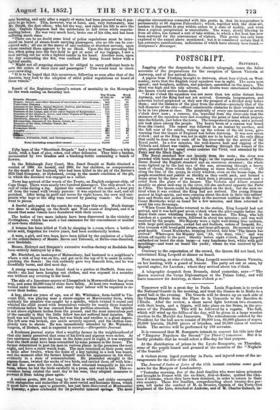POSTSCRIPT.
SATURDAY.
Lagging after the despatches by electric telegraph, come the fuller accounts of the preparations for the reception of Queen Victoria at Antwerp, and of her arrival there.
A pigeon from Flushing brought to Antwerp, about four o'clock on Wed- nesday, news that the English royal squadron was in sight. The news soon spread ; and burghers, soldiers, and populace, assembled on the quays. The wind was high and the tide adverse, and doubts were entertained whether the Queen would arrive before dark.
"At six o'clock the squadron was not more than ten miles distant from Antwerp, and the King had not yet arrived. Generals, burgomasters, and
echevius looked perplexed as they saw the prospect of a divided duty before them ; and the distance of the quay from the station—precisely that of the full diameter of the city—offered considerable obstacles to their evident wish
to be in two places at once. The perplexity of every one increased as seven
o'clock drew near ; a rumour, too, travelled from the river-side that the steamers of the squadron were fast rounding the point of land which projects into the Scheldt, just below the town. The troops stood to arms, and a general stir took place among the people. The heavy boom of a cannon was heard from the citadel. The report was followed in an instant by another, and the full roar of the salute, waking up the echoes of the old town, gave warning that the Queen of England was before Antwerp. It was now seven o'clock ; and as the King was not in sight nor to be heard of, the only thing
that could be done was to rush off to the river-side for the arrival of the Royal yacht. In a few minutes, the well-known hull and rigging of the Victoria and Albert was visible, proudly beating through the waters of the river, preceded by her usual avant courrier the Vivid, and attended by the Fairy and the Black Eagle."
The Royal standard flew out bravely from the main; the river was crowded with boats dressed out with flags; on the topmost pinnacle of Notre Dame floated the English standard and an enormous streamer ; the whole scene lighted up by the last rays of the sun, streaming through a heavy bank of clouds, from which the lightning at times flashed vividly. "All
along the line of the quays, in every window, even on the house-tops, the
people scrambled and jostled as thickly as they could pack, and formed a dense array by the lines of trees, which form a pleasing promenade and a
relief from the glare of the houses. The Victoria and Albert steamed steadily on about mid-way in the river, till she anchored opposite the Porte de l'Eau. The Queen could be distinguished on the deck ; but she soon re- tired when it was evident the King had not arrived. The young Princes seemed in high spirits, and were running about the desk in their tiny sailors' hats and frocks and jackets, as lightly as the merriest middies in the fleet." Count Moerkerke went on board for a few minutes, and then returned to await his own Sovereign.
"When Count Moerkerke returned to the station, King Leopold had not arrived, and it was half-past seven o'clock when the pilot-engine before the Royal train came whistling fiercely to the terminus. The King, who left Laecken at a quarter to seven, followed in about ten minutes ; and. was well received by the people. His Majesty wore a tight well-fitting blue uniform, with large gold epaulettes, cocked hat and feathers, orders of Leopold, &c., blue trousers with broad gold stripes, and large gilt spurs. He seemed in very good health. Count Moerkerke, stepping forward, told him 'The Queen has
arrived.' Whereupon his Majesty said, 'Ah, vita done, vita ! ' and was driven off rapidly to the port. Shortly before eight o'clock, King Leopold embarked on board the state barge—a very handsome boat, white with gold mouldings—and went on board the yacht ; where he was received by her
Contrary to the expectation of the crowd, the Queen did not land, but entertained King Leopold at dinner on board.
Next morning, at nine o'clock, King Leopold received Queen Victoria, on her landing, with a guard of honour. The party set out at once, by special engine, for Laecken ; where they arrived about ten o'clock.
A telegraphic despatch from Brussels, dated yesterday, says—" Tho Queen received the Corps Diplomatique at the Palace today, and will leave tomorrow for Antwerp, at three o'clock p.m."


























 Previous page
Previous page